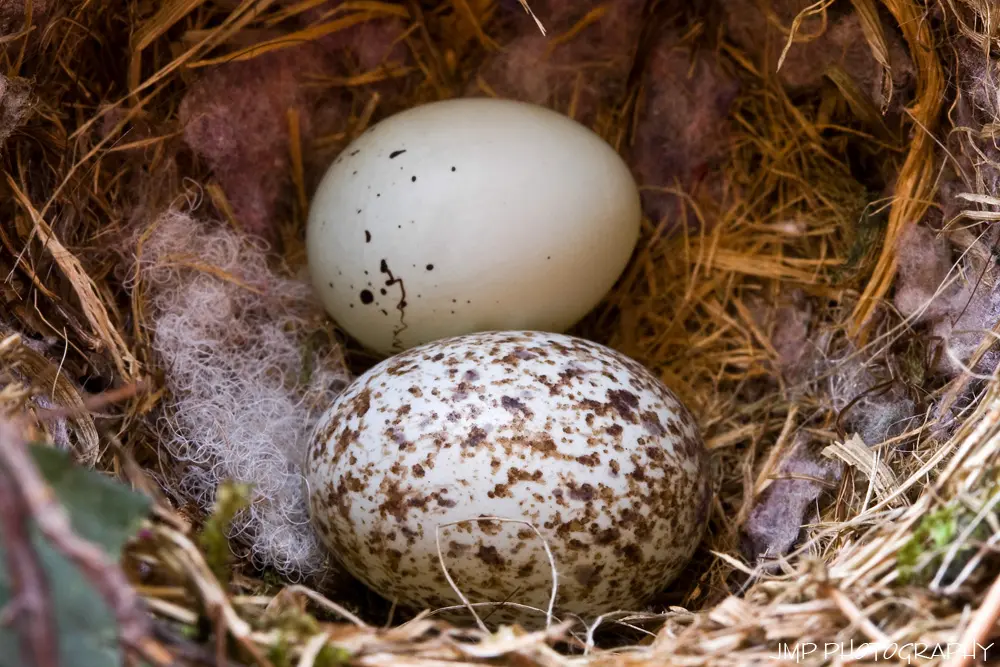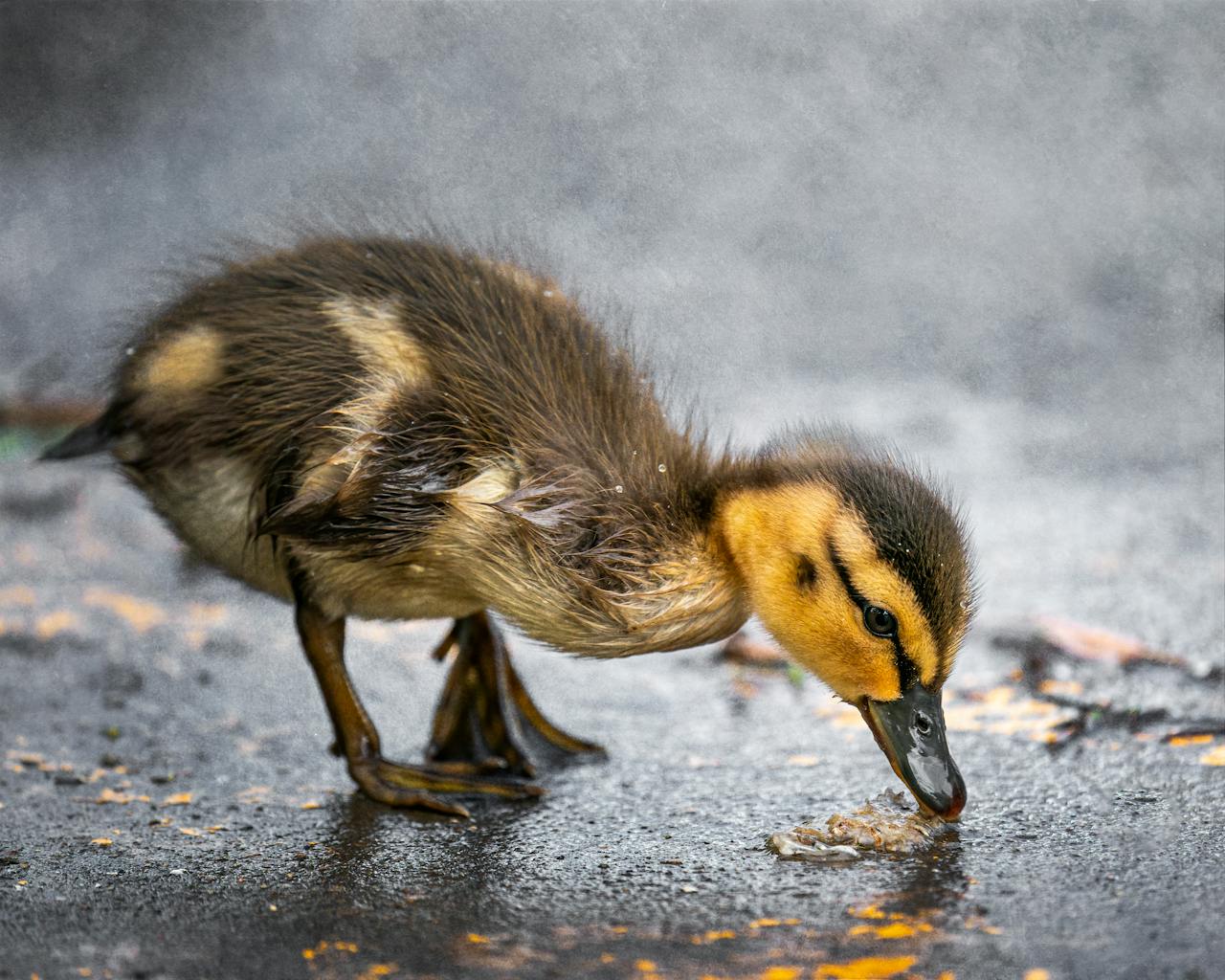The exact process for laying eggs varies by species. Nesting is typically done in spring, though some finches will nest multiple times a year if conditions are favorable. The male will generally build the nest, and once his mate has arrived, she will lay her eggs and then incubate them.
The birds mate and the male bird transfers the sperm from his cloaca to the female’s cloaca. The sperm then travels through the oviduct and mixes with yolk. The shell is made in the uterus and it takes about two days for a shell to form. Once the egg is laid, it takes about 11 to 14 days for the hen to lay another egg.
The nests of some finches may not be very elaborate, while others build rather large nests. They usually make their nests in trees or bushes close to the ground and they use whatever materials are available, such as grasses, weeds, moss and twigs.
Finches lay white eggs that can have spots (dots) on them and they usually lay one egg each day until they have a clutch of four to six eggs. After all of the eggs are laid, they will begin to incubate them for about 13 days before hatching
Symptoms of Finches Laying Eggs
Finches do not have a nesting season and can lay eggs at any time of the year. It is possible for them to lay eggs as early as three months old, but sometimes they can wait until they are 5 or 6 years old before laying.
It is important to know the symptoms of finches laying eggs so you can make sure the female bird is in good health and condition before she lays any eggs. You should also be aware of what she needs before, during and after she lays her eggs so that you can keep her safe and healthy.
If you have a pet finch and are hoping to see it give birth, there may be a few signs to look for that can tell you if your bird is going to lay eggs. Some of the symptoms are similar to those of a human pregnancy. However, only a doctor or veterinarian can confirm that your finch is going to lay eggs.
Some owners have reported that their birds became aggressive and possessive over their cages and nesting materials. This is one possible sign that she may be preparing to lay her eggs. One sign that your bird is going to lay eggs is an increase in egg-laying behavior. She might start laying dummy eggs, which means she lays an egg without any yolk. These will not hatch into chicks, but you should still remove them from the cage because they could cause health problems for your bird.
If you notice that your finch’s belly is swollen, this is also a sign she has eggs developing inside her uterus. The swelling should be slightly more noticeable than usual and may cause her body shape to shift downwards so it looks like she’s sitting on something even when she’s perching on her perch.
How to Take Care of Finch Eggs?
The first thing to do is make sure that the finch couple is ready to lay. This means that they will start singing and fluttering when they are trying to get ready to lay their eggs. When they are going to lay, they will stop eating as much as they usually do.
Once the eggs have been laid, you should be able to see them right away. You can either leave the eggs in the nest or remove them and keep them in a small container that you can place on top of a towel. If you are going to keep them in the nest box, make sure that you place some nesting material around the eggs so that they do not break when they fall.
You should place your finch eggs in an incubator for about two weeks until they hatch and then place them back into the nest. Some finches will stay with the eggs for about two weeks before leaving them for about four days so that they can eat and drink again.
Once your baby birds hatch, there is not much else you can do except feed them from time to time and let them grow up in their natural environment.
Will Finches Lay Eggs Without a Nest?
The eggs of finches are usually laid in a nest that is created by the female finch. However, even though this is the normal practice, it is also possible to find finches laying eggs on the bottom of their cages and in other unusual places.
Finches will lay eggs without a nest. In fact, many times you will find that they have laid several eggs in a single day, or have laid an egg that has not been fertilized. There may be several reasons for these occurrences, but most of them have to do with the age and health of your finch. It is possible to encourage your finch to lay eggs without a nest by providing her with an alternative safe box that you have created.
How Often Do Finches Lay Eggs?
Finches lay eggs roughly every five to seven days. It’s possible for finches to lay multiple clutches a year, but this varies from one species to another. The number of eggs in each clutch also varies from one species to another.
Finches typically lay eggs in pairs, with some species laying as many as eight in one breeding session. The female is responsible for doing all of the incubation, though both parents help to feed the chicks once they are born. This process can take anywhere from 11 to 14 days, at which point the chicks are ready to leave the nest.
The number of eggs a finch lays depends on which species it is and what time of year it is. Finches that breed in the summer typically only have one brood per season, while those that breed in the spring and fall may have two or three broods per season.
Finches are small, seed-eating passerine birds, and they belong to the Fringillidae family. Some of them are popular as cage birds because they’re easy to feed, and they provide pleasant songs.
Finches typically mate for life, and they can be found on all continents except Antarctica and South America. They live in open country or semi-open country, but they’re absent from dense forests.
Finch Egg Size
Finch eggs are very small, approximately the size of a black bean. The average egg will be 6-8mm in length and 3-5mm wide in diameter. It is said that most birds have eggs that are 1/25th their body weight. The average egg is 1/10th its mother’s weight.
Despite the fact that both male and female Finches are part of a monogamous pair, there is still competition amongst females for breeding opportunities. In order to gain an advantage, females will lay the largest eggs possible in the nest.
Larger eggs are favored for two reasons. First, larger eggs produce larger offspring which gives the fledglings a better chance of survival than their smaller nest mates. Secondly, once all the eggs have hatched, it is the size of the offspring that determines which birds get fed first by their parents. Once again giving them a better chance of survival and increasing their chances of successfully reaching maturity.





Leave a Reply